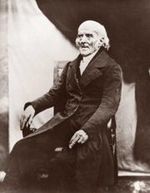Samuel Hahnemann
Christian Friedrich Samuel Hahnemann (April, 1755, Meißen - July 2, 1843, Paris) was a Saxon doctor, author, translator, occultist, and freemason of the lodge "Minerva of the Three Palms". He is the founder of homoeopathy. Hahnemann studied human medicine in Leipzig, Vienna, and Erlangen and became a doctor and author.
In 1796, Hahnemann composed the law of similars underlying homoeopathy. Shortly after 1800, there were first attempts of applying the treatment. Homoeopathy became popular about 1811, and Hahnemann established a practice in the town of Köthen.
As of 1830 first disputes about homoeopathy arose among supporters. During the last years in his life, Hahnemann emigrated to Paris.
Well-known works of Hahnemann on homoeopathy
(In German) Hahnemann S, Versuch über ein neues Princip zur Auffindung der Heilkräfte der Arzneisubstanzen, nebst einigen Blicken auf die bisherigen. In: Hufelands Journal der practischen Arzneykunde, Bd. 2 (1796), 3. Stück, S. 391 ff. sowie 4. Stück, S. 1 ff.
- Hahnemann S, Organon of the Rational Art of Healing, Dresden 1810. Later editions, increased and altered, with the title: Organon of the Rational Art of Healing, 2nd edition: Dresden 1818.
- (In German) Hahnemann S, Reine Arzneimittellehre. Theil 1-6. Leipzig, 1811-1821. 2nd increased edition: Leipzig 1822-1827.
- Hahnemann S, Chronic Diseases. Their specific nature and homoeopathic healing, published in five volumes. 1st edition: Leipzig 1828-1830. 2nd increased and altered edition: Leipzig and Dresden 1835-1839.
- Materia Medica Pura, translated and annotated by S.H. 2 Volumes. Leipzig 1790.
